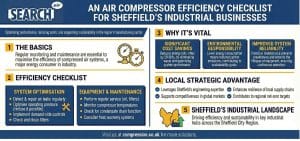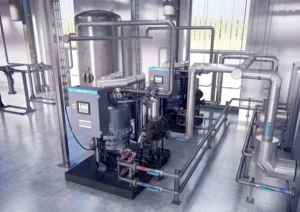An Air Compressor Efficiency Checklist for Sheffield’s Industrial Businesses
A typical compressed air system wastes 20-30% of the air it produces. This makes it one of the biggest – and most overlooked – operational costs for any industrial business. This “fourth utility” can account for up to 40% of a facility’s electricity bill, but a significant portion of that cost is avoidable.
Our checklist outlines a data-driven approach to eliminating waste, reducing energy costs, and enhancing system reliability for businesses operating in competitive hotspots, such as Sheffield.
Why Air Compressor Efficiency Matters
Sheffield’s high-value economy has been built on manufacturing sectors like aerospace and medical devices. These precision-driven industries have zero margin for error. An optimised compressed air system is a strategic asset, not just a utility. Inefficient systems not only waste money but also create significant operational risks.
The core problem
On average, one-third of the compressed air produced by an unmanaged system is wasted. Therefore, for businesses with high energy bills, reducing this waste can be a crucial step towards a healthier bottom line.

Improving compressed air efficiency reduces energy waste lowers costs and improves system reliability
Diagnosing Inefficiency: Common Profit Leaks in Your System
Before taking action, it is essential to have a clear understanding of where energy is being lost.
The silent saboteur: Air leaks
Air leaks are the single largest source of wasted energy. A single, barely audible 1.5mm leak can cost a business over £1,300 per year. These leaks are common at pipe joints, valves, and couplings. The cumulative effect can be staggering. A recent audit by Search Air (William G. Search Ltd.) at a Leeds-based chemical manufacturer identified 172 leaks, costing the business an annual £171,780.
The high cost of over-pressurisation
Many facilities operate their systems at a much higher pressure than required. This is often a misguided attempt to compensate for pressure drops. This practice creates “artificial demand,” forcing the system to consume more air and energy. A widely accepted rule states that for every 2 PSI reduction, energy consumption decreases by approximately 1%.
The threat of contamination
For advanced manufacturing and food & beverage sectors, air quality is non-negotiable. Contaminants can spoil products and damage sensitive equipment. Key risks include:
- Water (Moisture): Can cause corrosion in pipework and disrupt processes such as paint spraying.
- Oil “Carryover”: A critical issue in oil-lubricated units, it can contaminate products and cause seals to disrupt.
- Particulates such as Dust and rust can damage precision components and clog tools, potentially causing significant issues.
For applications requiring absolute purity, meeting the ISO 8573-1 Class 0 air standard is essential.
The price of neglect: Reactive maintenance
Operating on a “run-to-fail” mentality is an expensive one. Failing to perform simple maintenance tasks, such as filter cleaning, can have a snowball effect on the system. It will start with a loss in efficiency, which will lead to significant breakdowns and shutdowns. On average, unplanned downtime will cost a manufacturer $260,000 per hour without a contingency plan.

An Air Compressor Efficiency Checklist for Sheffield’s Industrial Businesses
The Ultimate 3-Phase Checklist to Reduce Energy Costs
Identify the most critical areas to address by phasing from foundational to strategic, long-term solutions.
Phase 1: Foundational Assessment & Analysis
You cannot manage what you do not measure. This phase is about gathering accurate data.
- Conduct a Professional System-Wide Audit: This is the non-negotiable first step. A professional compressed air energy audit uses data loggers to measure pressure, flow, and power consumption. This provides an objective baseline and a roadmap for improvement.
- Perform a Leak Detection Survey: Most leaks are inaudible over production noise. A survey using ultrasonic detectors can precisely pinpoint and quantify every leak. A targeted service for compressed air leak detection in Sheffield is the most effective way to address this issue.
Phase 2: Immediate Optimisation & Low-Cost Wins
This phase focuses on changes that offer the fastest return on investment.
- Repair All Leaks: Based on the audit report, initiate a systematic repair program to address all identified leaks.
- Reduce System Pressure: Having sealed the obvious leaks, set the system at the lowest pressure needed for the most critical application.
- Upgrade Condensate Drains: Consider zero-loss drains to eliminate wasted compressed air.
- Implement Proactive Maintenance: The key to a reliable and efficient system is a switch from a “fix it when it breaks” to a preventative maintenance culture. A regular schedule of inspections and servicing is critical. Don’t trust anyone but a specialist to ensure your service contracts are accurate and serviced with OEM parts.
Phase 3: Strategic Investments for Long-Term Gains
With the low-hanging fruit addressed, the final phase involves key capital investments.
- Upgrade to VSD Technology: For facilities with fluctuating air demand, VSD air compressors UK are the most significant energy-saving upgrade. They adjust motor speed in real-time to match air demand, delivering energy savings of 35% to 60%. Other manufacturers offer VSD options, but Atlas Copco’s GA VSD⁺ stands out for combining energy efficiency with advanced predictive monitoring.
- Install a Heat Recovery System: A compressor loses as much as 94% of its energy input as heat. A heat recovery system can harness this thermal energy and utilize it for space heating or preheating water.
- Deploy Modern Monitoring: Advanced air compressor monitoring systems, like Atlas Copco SMARTLINK UK, provide real-time data on system health and energy consumption. To learn how to make your air compressor more efficient, these tools are indispensable.
Fuelling Your Upgrade: Access Local Grants in South Yorkshire
Initial set-up costs are often the most significant obstacle. SMEs in Sheffield and throughout South Yorkshire can access the UK Shared Prosperity Fund (UKSPF) Low Carbon Project support for financial assistance. To be eligible, SMEs must be trading from commercial premises within the region and have fewer than 250 employees with a turnover of under £54 million.
This initiative provides eligible businesses with:
- An on-site, paid-for energy survey to identify potential savings.
- A capital grant of up to 50% of the total project cost (generally up to a maximum of £10,000).
The grant is applied directly to the capital costs of a project, such as a high-efficiency VSD compressor. A specialist provider like Search Air can conduct the audit necessary to justify your grant application and oversee its implementation.
Your Next Steps to Efficiency
Systematic compressed air optimisation is one of the single best projects your industrial business can invest in. With a structured approach, it’s possible to turn this significant overhead into an area of savings and competitive advantage. With the right provider of air compressor services in Sheffield, you’ll have the technology, expertise, and local support to make peak performance possible.
Want to reduce your energy bills and boost reliability? Call Search Air now to arrange your free #airCHECK or to book a detailed compressed air audit in Sheffield.

